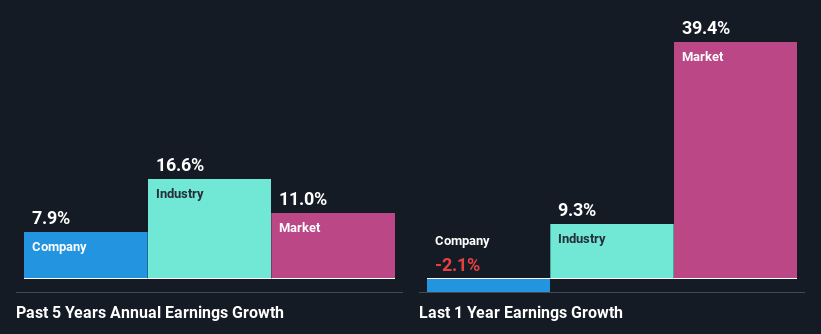Are IPH Limited's (ASX:IPH) Mixed Financials Driving The Negative Sentiment?
With its stock down 9.5% over the past three months, it is easy to disregard IPH (ASX:IPH). We, however decided to study the company's financials to determine if they have got anything to do with the price decline. Fundamentals usually dictate market outcomes so it makes sense to study the company's financials. In this article, we decided to focus on IPH's ROE.
Return on equity or ROE is a key measure used to assess how efficiently a company's management is utilizing the company's capital. Simply put, it is used to assess the profitability of a company in relation to its equity capital.
See our latest analysis for IPH
How Do You Calculate Return On Equity?
Return on equity can be calculated by using the formula:
Return on Equity = Net Profit (from continuing operations) ÷ Shareholders' Equity
So, based on the above formula, the ROE for IPH is:
13% = AU$54m ÷ AU$427m (Based on the trailing twelve months to June 2021).
The 'return' is the income the business earned over the last year. One way to conceptualize this is that for each A$1 of shareholders' capital it has, the company made A$0.13 in profit.
What Is The Relationship Between ROE And Earnings Growth?
So far, we've learned that ROE is a measure of a company's profitability. Based on how much of its profits the company chooses to reinvest or "retain", we are then able to evaluate a company's future ability to generate profits. Generally speaking, other things being equal, firms with a high return on equity and profit retention, have a higher growth rate than firms that don’t share these attributes.
IPH's Earnings Growth And 13% ROE
To begin with, IPH seems to have a respectable ROE. Even so, when compared with the average industry ROE of 23%, we aren't very excited. Although, we can see that IPH saw a modest net income growth of 7.9% over the past five years. So, there might be other aspects that are positively influencing earnings growth. Such as - high earnings retention or an efficient management in place. However, not to forget, the company does have a decent ROE to begin with, just that it is lower than the industry average. So this also provides some context to the earnings growth seen by the company.
As a next step, we compared IPH's net income growth with the industry and were disappointed to see that the company's growth is lower than the industry average growth of 17% in the same period.
Earnings growth is a huge factor in stock valuation. The investor should try to establish if the expected growth or decline in earnings, whichever the case may be, is priced in. Doing so will help them establish if the stock's future looks promising or ominous. Is IPH fairly valued? This infographic on the company's intrinsic value has everything you need to know.
Is IPH Using Its Retained Earnings Effectively?
The really high three-year median payout ratio of 104% for IPH suggests that the company is paying its shareholders more than what it is earning. In spite of this, the company was able to grow its earnings respectably, as we saw above. That being said, the high payout ratio could be worth keeping an eye on in case the company is unable to keep up its current growth momentum.
Besides, IPH has been paying dividends over a period of seven years. This shows that the company is committed to sharing profits with its shareholders. Upon studying the latest analysts' consensus data, we found that the company is expected to keep paying out approximately 85% of its profits over the next three years. However, IPH's ROE is predicted to rise to 21% despite there being no anticipated change in its payout ratio.
Conclusion
On the whole, we feel that the performance shown by IPH can be open to many interpretations. Although the company has grown its earnings moderately as a result of its respectable ROE, yet, the business is retaining hardly any of its profits. This might have negative implications on the company's future growth prospects. That being so, the latest analyst forecasts show that the company will continue to see an expansion in its earnings. To know more about the latest analysts predictions for the company, check out this visualization of analyst forecasts for the company.
Have feedback on this article? Concerned about the content? Get in touch with us directly. Alternatively, email editorial-team (at) simplywallst.com.
This article by Simply Wall St is general in nature. We provide commentary based on historical data and analyst forecasts only using an unbiased methodology and our articles are not intended to be financial advice. It does not constitute a recommendation to buy or sell any stock, and does not take account of your objectives, or your financial situation. We aim to bring you long-term focused analysis driven by fundamental data. Note that our analysis may not factor in the latest price-sensitive company announcements or qualitative material. Simply Wall St has no position in any stocks mentioned.

 Yahoo Finance
Yahoo Finance 
